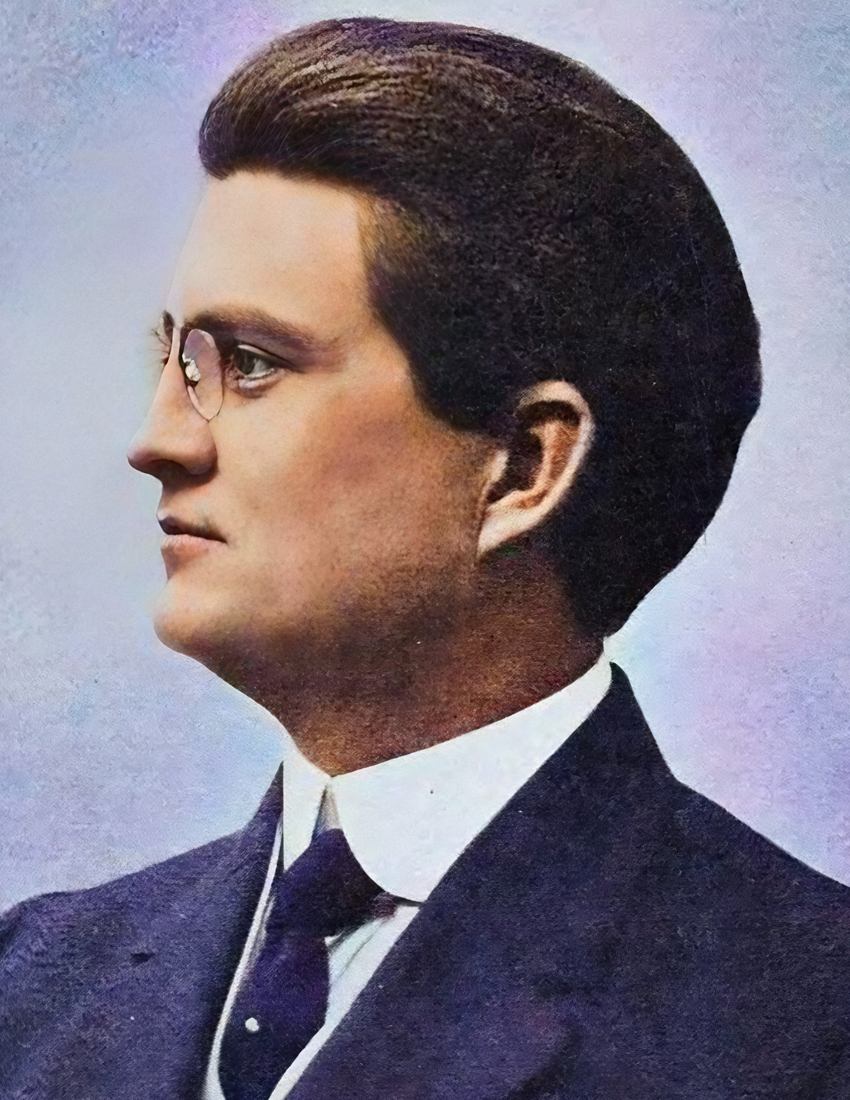Born: August 5, 1869, Bolton, CT.
Died: May 20, 1950, Ocean Grove, NJ.
Buried: Restland Memorial Park, East Hanover, NJ.
Grant Tullar

Hymns by Grant Tullar
The Weaver (The Tapestry Poem)
My life is but a weaving
Between my God and me.
I cannot choose the colors
He weaveth steadily.
Oft’ times He weaveth sorrow;
And I in foolish pride
Forget He sees the upper
And I the underside.
Not ’til the loom is silent
And the shuttles cease to fly
Will God unroll the canvas
And reveal the reason why.
The dark threads are as needful
In the weaver’s skillful hand
As the threads of gold and silver
In the pattern He has planned
He knows, He loves, He cares;
Nothing this truth can dim.
He gives the very best to those
Who leave the choice to Him.
The Weaver’s Tale: A Poem’s Journey
Perhaps Tullar’s most enduring legacy lies not in his hymns, but in a poem. “The Weaver,” often called “The Tapestry Poem,” found an unlikely champion in Corrie ten Boom, the Dutch Christian who sheltered Jews during World War II. Though Tullar penned the verses, ten Boom’s love for the poem’s message of faith amid suffering led many to mistakenly attribute it to her. The poem’s imagery of dark and golden threads weaving God’s grand design struck a chord with ten Boom, echoing her own journey of faith through unimaginable hardship. Through her, Tullar’s words found new life, touching hearts far beyond the realm of hymnody.
A Life Redeemed: The Extraordinary Journey of Grant Colfax Tullar
Few stories of hymn writers are as compelling as that of Grant Colfax Tullar. Born on August 5, 1869, in Bolton, Connecticut, Tullar’s life began under the shadow of hardship, yet blossomed into a testament of faith and perseverance.
From Tragedy to Tribulation
Named after President Grant and Vice President Colfax, young Grant’s life would prove far more challenging than his notable namesakes suggested. At the age of two, tragedy struck when his mother passed away, leaving behind nine children and a father disabled from injuries sustained in the Civil War’s Battle of Antietam.
The Tullar family, unable to stay together, scattered to the winds. Grant found himself passed from relative to relative, eventually landing in the care of a non-family member who subjected him to severe abuse. Before he reached his teens, Grant fled, choosing the uncertain streets over certain cruelty.
A Childhood Lost to Labor
Like a character plucked from the pages of a Dickens novel, young Grant worked tirelessly to survive. His small hands found their way into the dangerous world of child labor, a common but heart-wrenching reality of the era. In a woolen mill, amid the deafening clatter of machinery and choking clouds of fabric dust, Grant toiled for long hours. The work was grueling, the conditions perilous, and the pay meager, but it was his lifeline in a world that seemed indifferent to his plight.
Providence, however, had further plans in store for young Grant. A severe accident at the textile mill left him injured and unable to continue the backbreaking labor. But even in this setback, a glimmer of opportunity emerged. No longer fit for factory work, Grant found employment as an errand boy, a job that, while still demanding, spared his battered body from further harm.
The Crucible of Youth
As Grant entered his early teens, he found himself sharing a cramped, single-room apartment with three or four other boys in similar straits. This makeshift family of outcasts clung to each other for survival, but without guidance, they soon fell prey to the vices that often ensnare young men adrift in the world.
The streets became Grant’s education, teaching harsh lessons of survival and temptation. He sampled the bitter fruits of a life without direction, indulging in the temporary escapes offered by alcohol and other vices. By eighteen, Grant had sunk into the depths of alcoholism and despair.
The Brink of Despair
On a frigid winter night, drunk and hopeless, Grant teetered on the edge of a ferry, ready to plunge into the icy embrace of death. The dark waters below seemed to offer a final escape from a life that had known little but hardship. But God, working in mysterious ways, had other intentions.
An old man, seeing Grant’s perilous state, restrained him from his desperate act. With genuine concern, the stranger implored Grant to think of his mother’s heart and how it would break if he followed through.
In that moment, something stirred within Grant. The stranger’s compassion pierced through the haze of alcohol and hopelessness, igniting a spark of… something. Hope? Resolve? Whatever it was, it was enough. Grant stepped back from the edge, both literally and figuratively.
Tullar would later claim that it was at that moment, because of a stranger’s compassion, that he determined to seek God. The road ahead would not be easy, but for the first time in years, Grant felt a sense of purpose.
A Musical Awakening
At nineteen, Grant experienced a spiritual awakening at a Methodist camp meeting. The fervor of the prayers, the power of the preaching, and the soul-stirring hymns spoke to something deep within him. Here, amid the canvas tents and wooden benches, Grant Tullar gave his life to Christ.
This newfound faith opened doors he never knew existed. Kind-hearted church members, recognizing the potential in this rough-hewn young man, sponsored his education at Hackettstown Academy. It was a new world for Grant, one of books and learning rather than looms and labor.
Despite his limited schooling – he estimated he had about six months of formal education prior to this – Grant’s natural talent for music flourished. With only a rudimentary understanding of musical notation, gleaned from a few childhood singing schools, he impressed his peers with his ability to sing and compose hymns at the piano. It was as if the music had always been there, waiting for the right moment to pour forth.
From Pulpit to Publishing
While Grant trained for the Methodist ministry, his true calling lay in the power of sacred song. He soon found himself leading music for traveling evangelists, his voice and compositions touching hearts across the nation.
In 1893, Grant’s musical journey took a new turn when he partnered with Isaac H. Meredith to form the Tullar-Meredith Publishing Company. This venture would become a cornerstone of Christian music publishing, producing hundreds of hymnals, sheet music, and inspirational literature.
A Legacy in Verse and Melody
Grant’s pen flowed with words of hope and redemption, producing beloved hymns such as “Face to Face” and “Nailed to the Cross.” His collaborations with Carrie E. Breck, a fellow hymn writer who couldn’t carry a tune, resulted in some of the most touching hymns of their era.
One of his most enduring works, “Face to Face,” speaks to the universal longing of every believer:
Face to face I shall behold Him,
Far beyond the starry sky;
Face to face in all His glory,
I shall see Him by and by!
The Weaver’s Tale
Perhaps Grant’s most famous work, “The Weaver,” commonly known as “The Tapestry Poem,” gained posthumous popularity through Corrie ten Boom’s writings. This poem, with its profound message of faith amid life’s complexities, has touched countless lives, often mistakenly attributed to ten Boom herself due to her deep connection with its message.
A Symphony of Redemption
Grant Colfax Tullar’s life reads like a symphony of redemption. From the discordant notes of his troubled youth to the harmonious melodies of his hymns, his journey reminds us of the transformative power of faith and perseverance.
His hymns continue to inspire worldwide, offering comfort and hope to generations of believers. Through his words and music, Grant Tullar turned his pain into praise, his struggles into songs of salvation.
As we reflect on the life of this remarkable man, we’re reminded that our own stories, no matter how broken or discordant they may seem, can be transformed into beautiful melodies in the hands of the Divine Composer. Grant Tullar’s legacy lives on, not just in hymnals and poetry collections, but in the hearts of all who find solace and strength in his timeless words of faith.
Tullar’s life story serves as a powerful reminder that no life is beyond redemption, and that even the darkest nights can give way to the most beautiful dawns.

